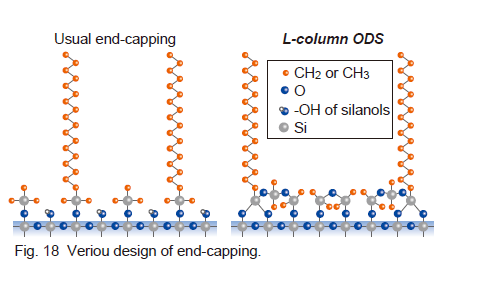End-capping method using high-temperature silylation Various end-capping methods are used by column manufacturers, but the residual silanol groups cannot thoroughly be eliminated by the usual end-capping methods. The residual silanol groups of
L-column ODS are almost entirely eliminated by the high-temperature silylation end-capping method (Fig. 18). Therefore, peak tailing derived from the residual silanol groups does not occur using L-column ODS and its high durability, even in acidic or basic mobile phases, minimizes deterioration

Performance with basic compounds
L-column ODS exhibits very little peak tailing because very few silanol groups remain accessible to samples.
Performance with chelating compounds
There is virtually no interaction between chelating compounds and metal impurities in L-column ODS because of the use of highly pure silica gel and extensive surface coverage using the patented end-capping technique.
Chemical stability
L-column ODS maintains retention under TFA mobile phase conditions due to the well protected silica surface by the patented end-capping. This decreases running cost of HPLC analysis
High efficiency and low column pressure
Well established column preparation technology and uniform, strong, spherical particles produce a column that is both efficient and easy to operate with a low back pressure
Physical property information
| Particle size | 3 μm, 5 μm |
| Pore size | 12 nm |
| Specific surface area | 340 m 2 / g |
| Carbon content | 17% |
| Modifying group | C18 (Octadecyl) |
| End capping method | High temperature gas phase endcapping |
| USP category | L1 |
| Used pH range | pH 2 to 9 |
L-column ODS appeared in 1990 as a column eliminating secondary interaction by residual silanol groups by high-temperature gas-phase end capping method. At that time the performance outstanding of the commercially available ODS column was positioned as a pioneer column. It is a column that you can use with confidence by stable supply for many years.
L-column ODS-V (with particle size 5 μm only) with certificate (Certificate of analysis )
L-column ODS-V has attached "Certificate of analysis" to L-column ODS . "Certificate of analysis" proves that the physical property values and separation behavior of the lot are within the standard. We support analytical method validation.











